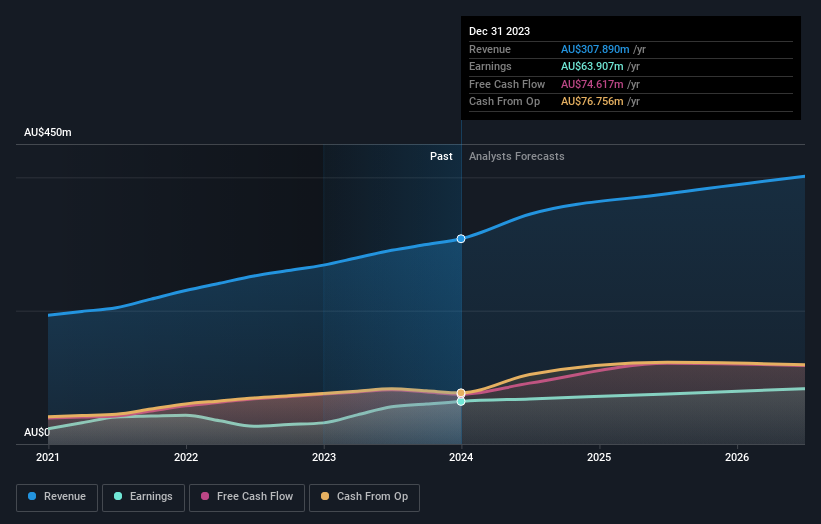PSC Insurance Group Limited (ASX:PSI) surges 9.2%; individual investors who own 47% shares profited along with insiders
Key Insights
Significant control over PSC Insurance Group by individual investors implies that the general public has more power to influence management and governance-related decisions
A total of 15 investors have a majority stake in the company with 50% ownership
Insiders own 43% of PSC Insurance Group
If you want to know who really controls PSC Insurance Group Limited (ASX:PSI), then you'll have to look at the makeup of its share registry. The group holding the most number of shares in the company, around 47% to be precise, is individual investors. In other words, the group stands to gain the most (or lose the most) from their investment into the company.
Following a 9.2% increase in the stock price last week, individual investors profited the most, but insiders who own 43% stock also stood to gain from the increase.
Let's take a closer look to see what the different types of shareholders can tell us about PSC Insurance Group.
Check out our latest analysis for PSC Insurance Group

What Does The Institutional Ownership Tell Us About PSC Insurance Group?
Many institutions measure their performance against an index that approximates the local market. So they usually pay more attention to companies that are included in major indices.
We can see that PSC Insurance Group does have institutional investors; and they hold a good portion of the company's stock. This suggests some credibility amongst professional investors. But we can't rely on that fact alone since institutions make bad investments sometimes, just like everyone does. When multiple institutions own a stock, there's always a risk that they are in a 'crowded trade'. When such a trade goes wrong, multiple parties may compete to sell stock fast. This risk is higher in a company without a history of growth. You can see PSC Insurance Group's historic earnings and revenue below, but keep in mind there's always more to the story.

PSC Insurance Group is not owned by hedge funds. Looking at our data, we can see that the largest shareholder is Paul Dwyer with 16% of shares outstanding. John Dwyer is the second largest shareholder owning 9.5% of common stock, and Brian Austin holds about 8.9% of the company stock. Interestingly, the bottom two of the top three shareholders also hold the title of Senior Key Executive and Vice Chairman, respectively, suggesting that these insiders have a personal stake in the company. Additionally, the company's CEO Antony Robinson directly holds 1.0% of the total shares outstanding.
After doing some more digging, we found that the top 15 have the combined ownership of 50% in the company, suggesting that no single shareholder has significant control over the company.
While studying institutional ownership for a company can add value to your research, it is also a good practice to research analyst recommendations to get a deeper understand of a stock's expected performance. There are plenty of analysts covering the stock, so it might be worth seeing what they are forecasting, too.
Insider Ownership Of PSC Insurance Group
While the precise definition of an insider can be subjective, almost everyone considers board members to be insiders. Management ultimately answers to the board. However, it is not uncommon for managers to be executive board members, especially if they are a founder or the CEO.
I generally consider insider ownership to be a good thing. However, on some occasions it makes it more difficult for other shareholders to hold the board accountable for decisions.
Our most recent data indicates that insiders own a reasonable proportion of PSC Insurance Group Limited. It is very interesting to see that insiders have a meaningful AU$852m stake in this AU$2.0b business. It is good to see this level of investment. You can check here to see if those insiders have been buying recently.
General Public Ownership
The general public-- including retail investors -- own 47% stake in the company, and hence can't easily be ignored. This size of ownership, while considerable, may not be enough to change company policy if the decision is not in sync with other large shareholders.
Private Company Ownership
Our data indicates that Private Companies hold 5.0%, of the company's shares. It might be worth looking deeper into this. If related parties, such as insiders, have an interest in one of these private companies, that should be disclosed in the annual report. Private companies may also have a strategic interest in the company.
Next Steps:
I find it very interesting to look at who exactly owns a company. But to truly gain insight, we need to consider other information, too. Consider for instance, the ever-present spectre of investment risk. We've identified 1 warning sign with PSC Insurance Group , and understanding them should be part of your investment process.
Ultimately the future is most important. You can access this free report on analyst forecasts for the company.
NB: Figures in this article are calculated using data from the last twelve months, which refer to the 12-month period ending on the last date of the month the financial statement is dated. This may not be consistent with full year annual report figures.
Have feedback on this article? Concerned about the content? Get in touch with us directly. Alternatively, email editorial-team (at) simplywallst.com.
This article by Simply Wall St is general in nature. We provide commentary based on historical data and analyst forecasts only using an unbiased methodology and our articles are not intended to be financial advice. It does not constitute a recommendation to buy or sell any stock, and does not take account of your objectives, or your financial situation. We aim to bring you long-term focused analysis driven by fundamental data. Note that our analysis may not factor in the latest price-sensitive company announcements or qualitative material. Simply Wall St has no position in any stocks mentioned.

 Yahoo Finance
Yahoo Finance 